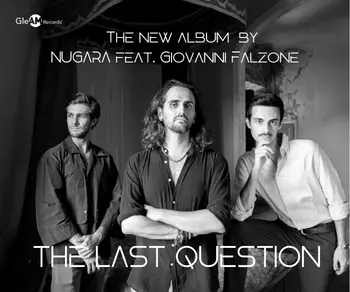Angelini, Abdou, Niescier: Lotus Flowers (Abalone Productions AB035)
Pianist and composer Bruno Angelini is but one of the three names new to me on this release. His leadership of the date is nominal in the musical sense as this is a slightly unusual trio consisting of himself, Sakina Abdou on tenor sax and Angelika Niescier on alto sax, and the overall effect of the music is down to all three members, but pronounced in the compositional sense as the entire programme comes from his pen. By his own admission his favourite musician is Wayne Shorter, but his music, at least as it’s realised here, owes no overt debt to that past master, as far as I can hear.
Instead, proceedings are the embodiment of a strain of contemporary jazz that errs on the side of the lyrical and reflective but still retains a vitality which sets it apart from what, for want of a better term, might be called the ECM school. Abdou’s solo on the opening Hull House serves notice of her relative individuality of tone, hemmed in though she is by the compositional framework which has the effect of imposing restraint.
The wistfully melancholic Por La Defensa De Los Rios is a thing of unassuming beauty complete with echoes of the kind of thing Charlie Haden’s Liberation Music Orchestra might once have realised. The saxophones combine to convey the effect of a modest choir, while Angelini’s solo is a model of restraint, though not to the point where the music simply merges with the background.
Race For The Earth is within this context unusually animated and is a title reflective of Angelini’s concern for the future of this planet, as opposed to some nominal soundtrack for yet another spectacle of human beings in competition. All three musicians seem to dance around each other, with Niescier leading the dance. Despite seeming anomalous given the prevailing feel of the album, it highlights another facet of the trio’s art.
Pitch, Rhythm and Consciousness: Sextet (Reva Records RR-1005)
For me this is one of those occasions when there’s too much to listen to, in the sense that the singing of texts drawn from Buddhist and Taoist sources (to identify but two of the traditions represented) have the arguably inevitable effect of grounding the music, given that the average ear finds it so difficult to hear beyond the words, as it were.
The seven minutes and 15 seconds of The Beginning Of The Universe is a case in point. For me, the vocal distracts from the instrumental intrigue, rife as it is with the kind of stealthy gradualism that was once a mark of the Spontaneous Music Ensemble, and my ignorance of the tradition from which the text is drawn blinds me to the power of any message the words might intended to convey.
The uncontrived solemnity of Kush, in which the tenor saxophones of Jessica and Tony Jones conjure up something entirely at odds with the testosterone-fuelled “battles” of old, evolves over five minutes and 23 seconds into a thing of beauty, aided in no small part by the absence of a vocal. The Jones / Jones improvisation in Fundamental Blue evokes the spirits of Lou Gare, Lee Konitz and Warne Marsh and Marsh with Gary Foster in that it creates the impression of music being plucked out of the air that’s simultaneously being fashioned within an environment that’s not entirely free of all determinants.
Coming late in the programme as it does, Whose Tears Are These convinces me that I’d readily stake a claim to review any instrumental set this group put out in the future: beneath the music’s almost diffident surface there are depths of subtlety, in terms both of interplay and of prompts which provoke further instrumental commentary.
Tony Tixier: Poems Never End (Whirlwind Recordings WR4833)
As far as I can hear, pianist Tony Tixier’s variation on the established piano, bass and drums theme is very much of the harmonically rich, thematically deficient contemporary jazz idiom and is quite at odds with, say, Hiromi’s short-attention-span hyperactivity and what might be called the Bill Evans school of three-way conversation. Busy drummer Jongkuk Kim, while not of the Billy Cobham persuasion, is a musician prone to stating everything and implying nothing and thus emphasises that distance from the Evans ideal.
At four minutes and 55 seconds Blues For The Real Human Beings is the longest piece on the album. The trio hits its stride at around the two-minutes-fifty mark and for the remainder highlights how, stretching out, they can fill the time creatively – even while the music exemplifies a kind of formlessness that’s a mark of the album overall.
Thelonious Monk’s Work is “reimagined” to the point where nearly all traces of the composer’s considerable signature are erased, suggesting that the trio might think he didn’t get it right the first time. As it is, the music falls right into the category in the first paragraph and doesn’t leave much of an impression on me.
Tropical Blues, with Mino Cinelu joining the trio on percussion, is maybe unsurprisingly the most rhythmically animated piece, but its fade ending (something of a contradiction in terms, surely) highlights the sense of formlessness, as do the less than four minutes of Present, albeit for different reasons. It catches the trio kind of going straight into the moments when the theme’s been stated and the solos are underway. It ends very abruptly, as though an ending has been reached that’s obvious only to the musicians themselves.




